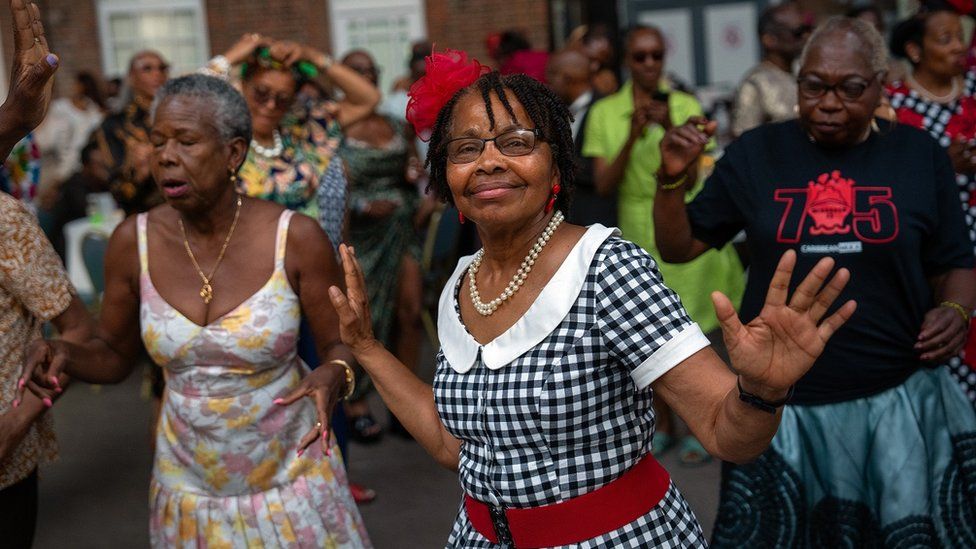Black History Month: What is it and why does it matter?
- Published

October marks Black History Month in the UK.
The event began in the US in the 1920s, and was first celebrated in the UK in 1987.
It also takes place in Canada, Germany and Ireland.
When is Black History Month and what is it?
In the UK, Black History Month happens every October.
It gives everyone the opportunity to share, celebrate and understand the impact of black heritage and culture.
People from African and Caribbean backgrounds have been a fundamental part of British history for centuries. However, campaigners believe their contribution to society has often been overlooked or distorted.
Greater attention has been paid to the importance of the Windrush generation and the Black Lives Matter movement in recent years, especially since the 2020 death of unarmed African American man George Floyd.
How did Black History Month start?
The event was the brainchild of Carter G Woodson, known as the father of black history.
Born in Virginia in 1875 to parents who were former slaves, he had limited access to education and job opportunities. But he was able to study at one of the few high schools for black students after saving money earned by working as a coal miner.
Woodson went on to gain various qualifications, including a PhD in history from Harvard University, and became a professor at Howard University.
Throughout his life, he worked tirelessly to promote black history in schools.
In 1926 he launched the first Black History Week, set in February to coincide with the births of former President Abraham Lincoln and Frederick Douglass. Both men played a significant role in helping to end slavery.
The event was expanded in 1970, and since 1976 every US president has officially designated February as Black History Month.
A separate holiday - "Juneteenth", held on 19 June - commemorates the end of slavery in the US.
How did Black History Month start in the UK?
The first Black History Month in the UK took place in 1987, the 150th anniversary of the abolition of slavery in the Caribbean.
It was arranged by Akyaaba Addai-Sebo, who came to the UK from Ghana as a refugee in 1984. Like Woodson before him, he wanted to challenge racism and celebrate the history of black people.
October was chosen partly because it's traditionally a time when African leaders gather to talk about important issues, and partly because it was at the start of the school year.
How is Black History Month celebrated in the UK?
When Black History Month first began, there was a big focus on black American history. Over time the event has prioritised black British history and key black figures from the UK, such as:
- Walter Tull, the first black officer to command white troops in the British Army, and one of English football's first black players
- Malorie Blackman, bestselling author and the first black Children's Laureate
- Shirley J Thompson, leading composer and conductor
- Lewis Hamilton, the only black driver in Formula One
Black History Month is also celebrated in local communities, where museums, care homes and workplaces explore a broad range of topics, from Britain's colonial past to migration and music.
For 2023, people are being encouraged to find out more about the exceptional achievements of black women, especially those who have been forgotten.
There is a national poetry competition, open to primary, secondary, college, and university students across the UK.
The contribution of the Windrush generation is also being celebrated, 75 years after the arrival of passengers on HMT Empire Windrush to the UK.
Other events include:
- a UK-wide run of shows from top black comedians organised by Cobo (Comedy of Black Origin)
- a festival of films, talks and performances focussed on black excellence in the Royal Ballet
- a free tour exploring female scientists of colour at the Natural History Museum in London
Is black history taught in schools?
For many children in the UK, October is the only time of the year they will learn about black history.
Wales became the first nation in the UK to introduce mandatory changes to its curriculum in 2022, including lessons about black history, racism and contributions of figures from black, Asian and other ethnic minorities.
Education is a devolved issue and in England there are no such plans to make changes.
The UK government says black history is an important topic, and that schools have the freedom to teach it within the existing history curriculum, from primary-school age onwards.